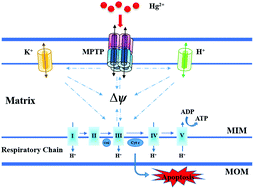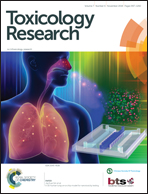In vitro modulation of mercury-induced rat liver mitochondria dysfunction
Abstract
Mercury (Hg) is a toxic environmental pollutant that exerts its cytotoxic effects as cations by targeting mitochondria. In our work, we determined different mitochondrial toxicity factors using specific substrates and inhibitors following the addition of Hg2+ to the mitochondria isolated from Wistar rat liver in vitro. We found that Hg2+ induced marked changes in the mitochondrial ultrastructure accompanied by mitochondrial swelling, mitochondrial membrane potential collapse, mitochondrial membrane fluidity increase and Cytochrome c release. Additionally, the effects of Hg2+ on heat production of mitochondria were investigated using microcalorimetry; simultaneously, the effects on mitochondrial respiration were determined by Clark oxygen-electric methods. Microcalorimetry could provide detailed kinetic and thermodynamic information which demonstrated that Hg2+ had some biotoxicity effect on mitochondria. The inhibition of energy metabolic activities suggested that high concentrations of Hg2+ could induce mitochondrial ATP depletion under MPT and mitochondrial respiration inhibition. These results help us learn more about the toxicity of Hg2+ at the subcellular level.



 Please wait while we load your content...
Please wait while we load your content...